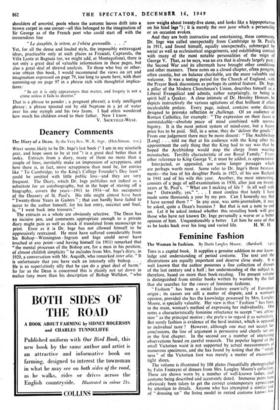Deanery Comments
The Diary of a Dean. By the Very Rev. W. R. Inge. (Hutchinson. 2 Is.)
WHAT seems likely to be Dr. Inge's last book (" I am in my ninetieth year, and hope soon to be at rest ") is a great deal better than it looks. Extracts from a diary, many of them no more than a couple of lines, inevitably make an impression of scrappiness, and here there is, in fact, more scrappiness than need be, for entries like " To Cambridge, to the King's College Founder's Day feast " could be omitted with little public loss—and they are very frequent. The Diary, which Dr. Inge publishes not indeed as a substitute for an autobiography, but in the hope of staving off a biography, covers the years-1911 to 1934—of his occupancy of the Deanery of St. Paul's. His title might almost have been " Twenty-three Years in Gaiters " ; that can hardly have failed to occur to the author himself, for his last entry, succinct and final, Is, " 1 went back into trousers."
The extracts as a whole are obviously selective. The Dean has an incisive pen, and comments appropriate enough to a private diary might pain as well as shock if translated from manuscript to print. Even as it is Dr. Inge has not allowed himself to be oppressively restrained. He must have suffered considerably from his Bishop—Winnington - Ingram and Inge could never have touched at any point—and having himself (in 1911) remarked that " the mental processes of the Bishop are, for a man in his position. of almost childish simplicity " he includes from Mrs. Inge's diary. in 1920, a conversation with Mr. Asquith, who remarked inter alia. " It Is unfortunate that you have such an intensely silly bishop. . . . He is so superlatively silly that he can do a great deal of harm." So far as the Dean is concerned this is plainly not set down in malice (any more than his description of Bishop Welldon, "who now weighs about twenty-five stone, and looks like a hippopotamus on his hind legs ") ; it Is merely the mot juste which a personality or an occasion evokes.
And they are both instructive and entertaining, these comments. Dr. Inge was called unexpectedly from Cambridge to St. Paul's
in 1911, and found himself, equally unexpectedly, submerged by social as well as ecclesiastical engagements, and establishing contact with many of the most notable personalities of the reign of George V. That, as he says, was an era that is already largely past ; the Second War and its aftermath have brought other conditions and other manners. These notes on a closed chapter, often pungent, often caustic, but on balance charitable, are the more valuable and welcome. It was a testing period for the Church of England, with the Prayer Book discussions as perhaps its central feature. Dr. Inge, a pillar of the Modern Churchman's Union, describes himself as a Liberal Evangelical and admits, rather surprisingly, to being in spirit half a Quaker. A close intimate of Dr. Hensley Henson, he depicts instructively the various agitations of.that brilliant if often incalculable prelate. Every page, indeed, contains some dictum designed to provoke reflection or challenge. Of an audience of Roman Catholics, for example : " The expression on their faces is unmistakable—absolute peace of mind combined with narrow bigotry. It is the most potent system of mind-cure, but a heavy price has to be paid. Still, in a sense, they do ' deliver the goods'." From one judgement there may be more dissent: " The Archbishop [Lang] . . . told me that at his audience with the King after his appointment the only thing that the King had to say was that he hoped the Archbishop would stop the clergy from wearing moustaches. Terribly characteristic of our Royal Family." Every other reference to King George V, it must be added, is appreciative.
Interjected, or appended, are some longer passages which are perhaps worth most. Some refer to Dr. Inge's three bereave- ments—the loss of his daughter Paula in 1923, of his son Richard in 1941 and of his wife this year. Another, the most interesting. consists of a page of self-examination in 1930, after just on twenty years at St. Paul's. " What am I making of life ? Is all well with me ? Outwardly, yes." ". . . I must confess that lately I have made some thousands a year by my pen. Can I honestly say that I have earned them ? " In any case, was semi-journalism, it may be asked, quite a Dean's business ? But that is not a note to end on. Let it be asked instead whether this revealing book- will give those who have not known Dr. Inge personally a worse or a better opinion of him. Unquestionably a better. Let him be sure of that
as he looks back over his long and varied life. H. W. H.


































 Previous page
Previous page